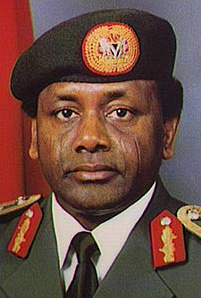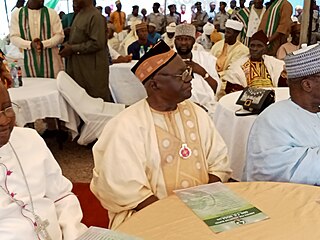
Sani Abacha;was a Nigerian military dictator and statesman who ruled Nigeria with an iron-fist as military head of state from 1993 following a palace coup d'état until his death in 1998.

Umaru Musa Yar'Adua;16 August 1951 –5 May 2010) was a Nigerian politician who served as the president of Nigeria from 2007 until his death in May 2010. He won the Nigerian presidential election held on 21 April 2007,and was sworn in on 29 May 2007.
Dodan Barracks is a military barrack located in Ikoyi,Lagos,Nigeria. The barrack was the Supreme Military Headquarters during the Nigerian Civil War and from 1966 to 1979 and 1983 to 1985,Dodan Barracks was the official residence of the military heads of state of the Nigerian military juntas of 1966–79 and 1983–99,and also the Supreme Military Headquarters from 1966 until the move to Abuja in 1991.
Ahmed Muhammad Daku is a retired Nigerian Army brigadier general who was the military Governor of Kano State from August 1985 to December 1987. He later became military Governor of Sokoto State from December 1987 to August 1990.
Garba Duba was a Nigerian Army Lieutenant general who was Governor of Bauchi State,Nigeria from July 1978 to October 1979 during the military regime of General Olusegun Obasanjo,and Administrator of Sokoto State from January 1984 to August 1985 during the military regime of Major General Muhammadu Buhari.
Paul Ufuoma Omu was Military Governor of South-Eastern State,Nigeria between July 1975 and July 1978 during the military regimes of Generals Murtala Muhammed and Olusegun Obasanjo.

Zamani Lekwot is a retired Nigerian Army major general who served as the military governor of Rivers State,Nigeria from July 1975 until July 1978 during the military administrations of Generals Murtala Muhammed and Olusegun Obasanjo.
Mohammed Chris Alli was a Nigerian Army major general who served as Chief of Army Staff from 1993 to 1994 under General Sani Abacha's regime and was military governor of Plateau State Nigeria from August 1985 to 1986 during the military regime of General Ibrahim Babangida. Many years later,he was appointed interim administrator of the state during a 2004 crisis in the state following ethno-religious killings in Shendam,Yelwa Local Government.
Chris Abutu Garuba was Governor of Bauchi State,Nigeria from August 1985 to December 1988 during the military regime of Major General Ibrahim Babangida. He was born in Ipole,Otukpa Ogbadibo Local Government Area of Benue State.
Colonel Anthony Aboki Ochefu was a Military Governor of East Central State from July 1975 to February 1976 during the military regime of General Murtala Mohammed.
Abdullahi Mohammed is a retired Nigerian Army major general,who served as chief of staff to presidents Olusegun Obasanjo and Umaru Musa Yar'Adua from 1999 to 2008;National Security Adviser to General Abdusalami Abubakar from 1998 to 1999;Director General of the National Security Organization from 1976 to 1979;and Governor of Benue-Plateau State,Nigeria from July 1975 to February 1976 during the military regime of General Murtala Mohammed.
Chief Akintunde Aduwo is a retired Nigerian Navy Vice Admiral who served as Chief of Naval Staff from 1980 to 1983 and as military governor of the Nigerian Western State from July 1975 to August 1975 during the military regime of General Murtala Muhammed.
Muktar Muhammed was the military governor of Kaduna State,Nigeria from July 1978 to October 1979 during the military regime of General Olusegun Obasanjo. Wing commander Muktar Muhammed played an active role in the coup that brought General Murtala Mohammed to power,and was appointed to the new Supreme Military Council on 30 July 1975. He was appointed governor of Kaduna State in 1977,in which position he was promoted to Group Captain. He retired from the Service of the Nigerian Air Force at the rank of Air Vice Marshal (AVM).
Patrick Aziza was the first military Governor of Kebbi State,Nigeria after it was split off from Sokoto State on 27 August 1991 during the military regime of General Ibrahim Babangida.
John Yahaya Madaki (?–2018) was military governor of Katsina State,Nigeria in December 1989,during the military regime of General Ibrahim Babangida. He handed over to the elected civilian governor Saidu Barda in January 1992 at the start of the Nigerian Third Republic.

Presidential elections were held in Nigeria on 16 April 2011,postponed from 9 April 2011. The election followed controversy as to whether a northerner or southerner should be allowed to become president given the tradition of rotating the top office between the north and the south after the death of Umaru Yar'Adua,a northerner,when Goodluck Jonathan,another southerner assumed the interim presidency.

Sambo Dasuki is a retired Nigerian military officer who served as National Security Adviser to President Goodluck Jonathan and briefly to President Muhammadu Buhari.

Major General Mohammed Shuwa was a Nigerian military officer and the first General Officer Commanding of the Nigerian Army's 1st Division. Shuwa commanded the 1st Division during the Nigerian Civil War. He was murdered in Maiduguri by suspected Boko Haram militants on 2 November 2012.
Shehu Sani is a Nigerian senator,an author,playwright and a human rights activist. He is the President of the Civil Rights Congress of Nigeria - (CRCN). and was the Chairman of Hand-in-Hand,Africa. He was a leading figure in the struggle for the restoration of democracy in Nigeria. He has been arrested and jailed by successive past military regimes in Nigeria. He was released from life imprisonment when democracy was restored in Nigeria in 1999. He contested and won the Kaduna Central Senatorial District on the platform of the All Progressive Congress on 28 March 2015.





